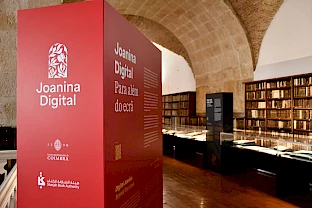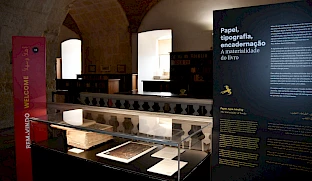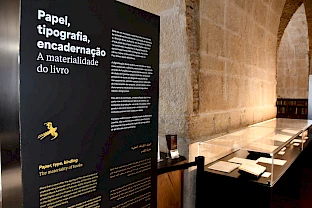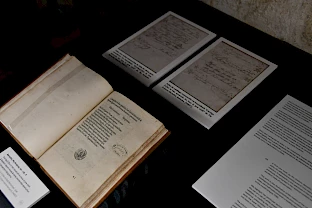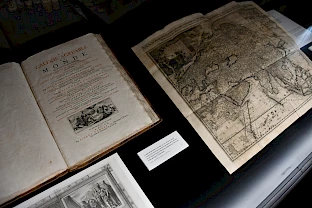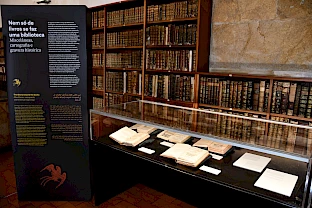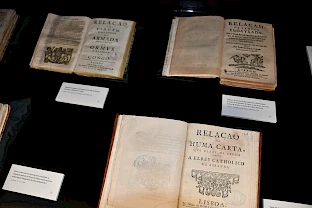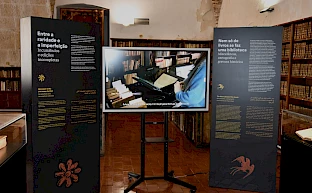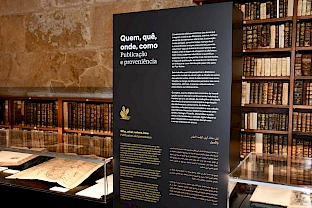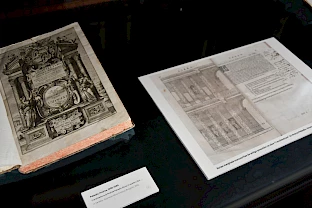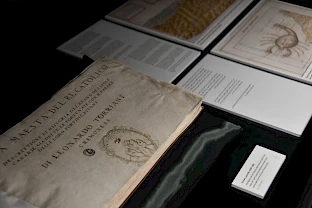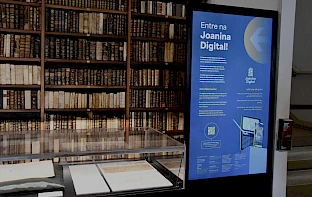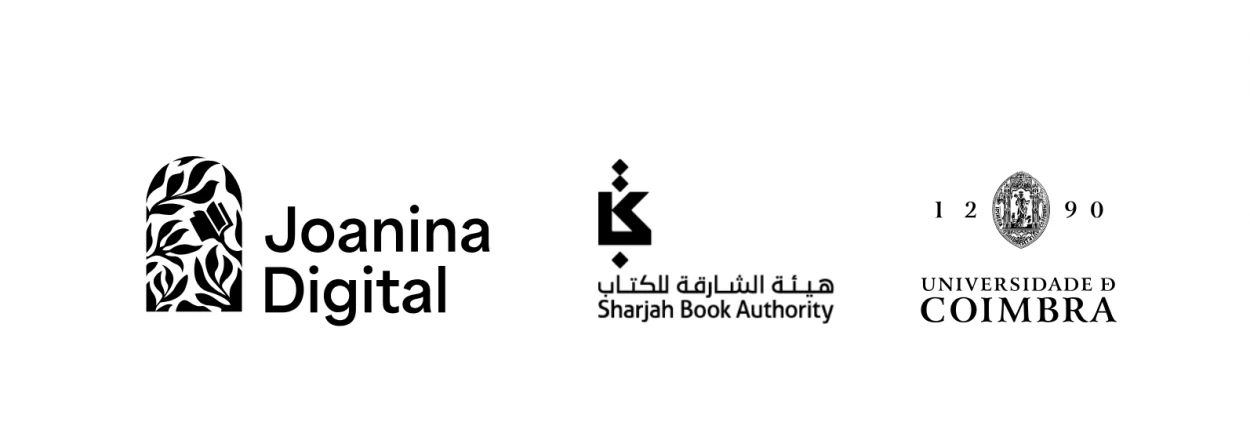The Joanina Digital Library
On October 3 2025, the University of Coimbra (UC) launched the Joanina Digital webpage on the UC Digitalis platform, making the holdings of this emblematic library available online. At 11:30 a.m., the launch of the Joanina Digital Library platform took place, featuring the public presentation of the pilot project results – focused on the digital collection dedicated to the Middle East (a valuable resource for research on the Portuguese presence in the Gulf and the Arabian Peninsula). It should be noted that the overall project, initiated in February 2024, aims to digitize and make available online, by 2030, around 30,000 volumes from the Main Floor of the Joanina Library, comprising nearly 20 million images. This ceremony, held at the Joanina Library – which included the launch and presentation (by José Pedro Paiva, Full Professor at FLUC) of the work “A Momentous Journey: The Complete Manuscript of the Book of Duarte Barbosa, 1565”, authored by H.H. Sheikh Dr. Sultan bin Muhammad Al-Qasimi – also featured remarks by the UC Rector, Amílcar Falcão.
Testimonies
«This project to digitize around 30,000 volumes from the Noble Floor of the Joanina Library goes far beyond the simple transfer of books from paper to digital format. It represents a programmatic effort to enhance a unique collection, including the recovery of volumes in need of conservation and restoration. Joanina Digital is also an opportunity to project, into the digital realm, one of the most beautiful libraries in the world, while fostering innovative technical solutions and cutting-edge research, as befits a prestigious University.
Preserving the legacy of the past, responding to present challenges, and preparing for the future are central to our mission. That the University of Coimbra develops this project in partnership with the Sharjah Book Authority is a clear expression of the value of international cooperation in promoting culture, science, and shared knowledge.»
Amílcar Falcão, Rector of the University of Coimbra
«The Joanina Library carries the memory of centuries. Its walls and books speak of human effort, of minds that sought knowledge and wisdom. Preserving these works is not merely a task of keeping the past… it is a duty to the future. Knowledge must travel beyond the library to reach those who will build, guide, and renew nations. When the mind is nourished by learning, societies grow strong, and civilisations endure.
Sharjah’s support for this project reflects a belief I have long held: human development precedes all institutions, and culture is the foundation upon which nations and civilisations rise. Joanina Digital opens a bridge between Europe and the Arab world, connecting generations of scholars, researchers, and students to rare knowledge that informs the present and builds the future. Through collaboration, foresight, and the careful stewardship of heritage, we ensure that the legacy of learning continues to guide our global civilisation.»
His Highness Sheikh Dr. Sultan bin Muhammad Al Qasimi, Member of the Supreme Council and Ruler of Sharjah
«What does it mean to digitise a library of old books such as the Joanina Library? The act of digitisation should be seen as a challenge that offers opportunities for innovation at the level of the digital infrastructure to be developed, at the level of the bibliographic description of the collection, and at the level of communication with readers and with society at large. The digitisation of a book is a critical operation that allows us to see a book at a second degree, that is, to see it as a device for the production and organisation of a worldview. If we move from the microscale of a single book to the macroscale of a library, we can say that the digitisation of an entire collection enables us to observe the library itself as an information system, with its own history and particular structure.
Joanina Digital will enable us to critically analyse the content of the books (their texts and their images), but also their self-organising structures and the very process that, over three centuries, resulted in the constitution of the collection. Digitisation makes it possible to look at the bibliographic heritage as an object of reading and re-reading, rather than an object of veneration and worship. Old books and the library become witnesses of themselves: they self-document representations and discourses about the world. Beyond new possibilities for the analysis of individual works, the aggregated digitisation of a collection allows us to imagine countless new questions supported by computational methodologies.»
Manuel Portela, Director of BGUC
Context
- Project: Digitization and open access availability of the Joanina Library’s Noble Floor collection (15th–18th centuries), with integration into the Europeana network, adopting principles of open science and interoperability.
- Objectives: preservation, global access, new methodologies of reading, research, and textual analysis.
- Partnership: University of Coimbra and Sharjah Book Authority (high patronage of H.H. Sheikh Sultan bin Muhammad Al-Qasimi).
Highlights
- Scale and access: digitization of the Noble Floor (≈ 30,000 volumes) in open access (facsimile images and text).
- Pilot: ~160,000 pages; 307 works processed; 3,343 volumes catalogued.
- Heritage archive: estimated ~20 million pages when completed.
- Interoperability: integration into Europeana; open science principles.
- Conservation: reduced handling; restoration, conservation, and preservation interventions.
- New readings: large-scale research, including AI and data mining, collaborative reading and editing.
- Calendar: started in 2024; pilot results online in 2025; conclusion in 2030.
FAQ
- How to access? Through the UC platform (accessible via the Joanina Digital page) and, progressively, via Europeana.
- When will more works be available? Continuous publication starting in 2025, as soon as they are validated.
- Are there any costs? No. Access is free and open.
- Can I reproduce images? Check licenses and credits in the media kit; editorial use requires mandatory credit.
- What is the 'Sultan bin Muhammad Al-Qasimi Collection'? A featured collection dedicated to the Middle East.
- How does digitization protect the books? It reduces physical handling and enables restoration and conservation actions.
This content is loaded from a third-party and is not available because your browser has cookies disabled.
Eis o que pode fazer
«Joanina Digital – Beyond the Screen»
In parallel, the exhibition «Joanina Digital – Beyond the Screen» was inaugurated, showcasing representative works undergoing digitization and addressing key themes for the technical treatment and study of this collection, such as provenance and the unique materiality of each copy.
Destaques
1. Overview
The Joanina Library houses a unique collection of several thousand printed books from the Early Modern era. Extending from the beginnings of typography to the end of the 18th century, this collection bears witness to the production, circulation, and organization of knowledge in that period. Considered one of the most beautiful and significant baroque libraries in the world, the Joanina Library is also one of the historic buildings that is part of the UNESCO World Heritage Site of the University of Coimbra.
The Digital Joanina Project aims to digitize the Joanina Library collection and create a multifunctional platform. In addition to building a structured repository, the project will provide access to all digitized content as facsimile images and text. Digital Joanina adopts principles of open science and interoperability, follows best practices for digitization of historical collections, develops policies and procedures to manage content and services at scale, and maintains a modular and open infrastructure.
When completed, the Joanina Digital Library will include the approximately 30,000 works stored on the main floor of the library. This project is the result of a partnership between the University of Coimbra and the Sharjah Book Authority (SBA), which will fund the project through the sponsorship of the head of state of Sharjah, Sheikh Sultan bin Muhammad Al-Qasimi, distinguished in 2018 as Doctor Honoris Causa by the University of Coimbra.
2. Impact
Digital Joanina's collections will be available free of charge to all users. Not only will the 500,000 annual visitors to the Joanina Library be able to discover its collections, but also all those who have not had the opportunity to visit it will be able to explore it in this way. For instance, The Digital Middle East Collection, named as the “Sultan bin Muhammad Al-Qasimi” collection, will provide a valuable resource for several scientific fields, facilitating structured access to a set of historical materials related to the history of the presence of the Portuguese in the Gulf / Arabian Peninsula.This contribution to the history of relations with the Arab world highlights the relationship between the University of Coimbra and the emirate of Sharjah.
Digital Joanina will also enable students and researchers to have aggregate access to a very significant sample of academic production from the 16th, 17th, and 18th centuries, including numerous works of European culture and science (many of which in their first editions). Furthermore, it will provide a new resource both for the systematic study of the production and circulation of books in that period, and for the study of the history of libraries as information systems.
It is also expected that the project will be able to develop a model for the digitization of old book collections from historical libraries, bringing together the following two objectives:
a) Public dissemination of collections: experts in various fields will be invited to curate digital exhibitions based on works selected from the Digital Joanina collection, thus mediating the content of this historical library for diverse contemporary global audiences in the electronic public space.
b) Fostering new research: Digital Joanina's infrastructure, data model and tools will be designed in ways that contribute to supporting future research projects dedicated to global cultural history, the history of production and organization of knowledge and the history of the book.
Finally, we hope that the future integration of Digital Joanina's collections into the Europeana heritage portal will contribute to increasing its global impact.
3. Implementation
To guarantee the technical robustness and scientific quality of the project, implementation was planned in two stages: the first stage, the first being “Pilot Project” (months 1 to 12). In this stage, the best solutions related to data acquisition, platform architecture and interface design will be tested. Technical standards, human resources, as well as workflow and quality control for the entire project will be calibrated.
The second stage, called “Noble Floor” (months 13 to 72), focuses on the digitization and complete cataloging of the main floor collection (c. 30,000 items) in accordance with the procedures resulting from the previous stage. Digital Joanina’s collections will be integrated into a new database of old books at the University of Coimbra, which will also include the current Almamater collection. Interfaces will be multilingual (Portuguese, English, and Arabic).
The project began in 2024 and is expected to be completed in 2030. As they are validated, new sets of documents will be progressively published.
4. Team
Coordination
Delfim Leão (Vice-rector for Culture, Communication and Open Science at the University of Coimbra)
Manuel Portela (Director of the General Library at University of Coimbra)
Eman Bushulaibi (Director of Sharjah Public Library)
Valentim Branquinho (Chief Technology Officer at UC Framework)
Karima Anrhourrache El Azizi (Head of International Affairs)
BGUC Working Group
Manuel Portela
Luisa Machado
Fátima Bogalho
Ana Miguéis
Ana Luisa Silva
Bruno Neves
Ana Gago
Sara Grünhagen
UC Framework Working Group
Valentim Branquinho
André Rodrigues
Pedro Lima
Tomás Mendes
Bruno Silva
Sharjah Working Group
Eman Bushulaibi
Karima Anrhourrache El Azizi
Fida Al Abed
Consultants
Johanna Drucker (UCLA)
Nuno Freire (Europeana)
Eva Schubert (MWNF - Museum With No Frontiers)
A. E. Maia do Amaral (UC)
5. News
UC Notícias, 21-02-2024: UC e Autoridade Literária de Sharjah celebram parceria para digitalizar acervo da Biblioteca Joanina
Público, 21-02-2024: Universidade de Coimbra vai digitalizar 30 mil livros antigos da Biblioteca Joanina
Expresso, 21-02-2024: Digitalização de 30 mil livros da Biblioteca Joanina de Coimbra custará €8 milhões
Antena 1, 21-02-2024: Obras literárias que estão na Biblioteca Joanina, em Coimbra, vão ser digitalizadas
RTP3 – Ensaio, 22-02-2024: Obras literárias que estão na Biblioteca Joanina, em Coimbra, vão ser digitalizadas
SIC Notícias, 16-03-2024: Cerca de 30 mil livros centenários da Biblioteca Joanina da Universidade de Coimbra serão digitalizados
Diário As Beiras, 20-02-2024: Financiamento dos Emirados Árabes Unidos para digitalizar Biblioteca Joanina
Diário de Coimbra, 22-02-2024: Tesouros da Biblioteca Joanina em formato digital
Sapo24, 21-02-2024: Oito milhões de euros para digitalizar 30 mil livros da Biblioteca Joanina de Coimbra
e-cultura.pt, 21-02-2024: Universidade de Coimbra vai digitalizar 30 mil livros antigos da Biblioteca Joanina
European Heritage Label, 19-09-2023: University of Coimbra initiates €8M project to digitize 30,000 century-old books from Joanina Library



